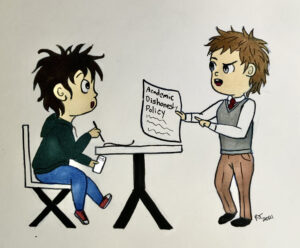
A committee of MCCC faculty members has been meeting to revise the Academic Dishonesty Policy. The committee consists of the Academic Review Committee and the office of the vice president of Enrollment Management and Student Success.
With the COVID-19 crisis, many of the meetings happened virtually and the committee emailed ideas back and forth, resulting in a longer revision process than originally estimated.
The policy had been in the process of revision for the past two years.
Scott Behrens, the vice president of Enrollment Management and Student Success, said MCCC tries to strive for a representative committee for all points of view and the committee wanted the policy to be as fair as possible.
Behrens explained that coming together with the committee allowed for a thorough discussion of whether certain things are a violation of what is considered dishonest.
Behrens said the goal of the policy “isn’t discipline, the goal is learning.”
The policy is being revised due to vague verbiage and unclear interpretation.
The vagueness of the policy had potential of unintentionally placing students in a compromising position.
Members of the revision committee Tracy Giacomini and Michelle Schwartz said the policy is revised as the committee encounters new issues that are not addressed in the current policy.
“It was the goal of the Academic Review Committee to include a general statement covering all major areas of possible academic dishonesty with examples in each area,” Giacomini said.
It has been several years since the policy was previously revised.
Once the policy is revised, it will be sent to the Board of Trustees for approval.
The policy can be found in the student handbook and online at monroeccc.edu/policies. The Academic Dishonesty policy is listed as 3.10(a).
Some professors may include the policy in the syllabi of their classes at MCCC.
Edmund La Clair, assistant professor of history, said he includes the policy in his syllabus.
La Clair said, “Having a policy does play a role in the class, but that role is to ensure that students are all treated fairly. This includes both the students who are accused of academic dishonesty, but also those who were ethical in their behavior.”
With the Academic Dishonesty policy in place to make sure every student is treated fairly, the revision aims to clarify anything that could be deemed unfair or vague

